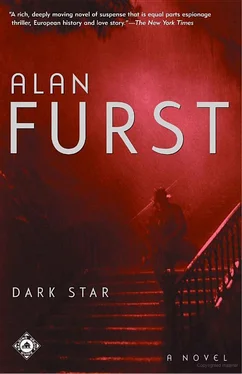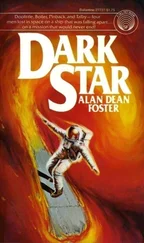Alan Furst - Dark Star
Здесь есть возможность читать онлайн «Alan Furst - Dark Star» весь текст электронной книги совершенно бесплатно (целиком полную версию без сокращений). В некоторых случаях можно слушать аудио, скачать через торрент в формате fb2 и присутствует краткое содержание. Жанр: Шпионский детектив, на английском языке. Описание произведения, (предисловие) а так же отзывы посетителей доступны на портале библиотеки ЛибКат.
- Название:Dark Star
- Автор:
- Жанр:
- Год:неизвестен
- ISBN:нет данных
- Рейтинг книги:3 / 5. Голосов: 1
-
Избранное:Добавить в избранное
- Отзывы:
-
Ваша оценка:
- 60
- 1
- 2
- 3
- 4
- 5
Dark Star: краткое содержание, описание и аннотация
Предлагаем к чтению аннотацию, описание, краткое содержание или предисловие (зависит от того, что написал сам автор книги «Dark Star»). Если вы не нашли необходимую информацию о книге — напишите в комментариях, мы постараемся отыскать её.
Dark Star — читать онлайн бесплатно полную книгу (весь текст) целиком
Ниже представлен текст книги, разбитый по страницам. Система сохранения места последней прочитанной страницы, позволяет с удобством читать онлайн бесплатно книгу «Dark Star», без необходимости каждый раз заново искать на чём Вы остановились. Поставьте закладку, и сможете в любой момент перейти на страницу, на которой закончили чтение.
Интервал:
Закладка:
To this end he played the part of a man ruined by sorrow, a victim of anti-German hostility. Practiced saying a single sentence in the sort of Volksdeutsch accent common to a man like Kringen: “They took … everything.” He had to use it almost immediately. A burly fellow, standing next to him on the dock, wanted to strike up a conversation and offered a greeting. Szara stared at him, as though he were intruding on a world of private anguish, and delivered his line. It worked. As Szara watched, the man’s expression went from surprise to pained sympathy, then tightened with anger. Szara bit his lip; he could not say any more without losing control. He turned his face away, and the man laid a great paw of a hand on his shoulder, the honest human warmth of the gesture very nearly shaming him into real tears.
A bright day. A calm sea.
Life aboard the passenger steamer was tightly organized. There were numerous officials in attendance but they seemed to Szara benign, meant to ease the transition of the emigrants into German life. He was processed-a matter of saying yes and no-given a temporary identity card, and told to report to the proper authorities wherever he settled and permanent residence documents would be provided at that time. Had he any notion of where he wished to live? Family in Germany? Friends? Szara hid behind his catastrophe. “Don’t worry, old fellow, you’re in good hands now,” said one official.
The public address system was constantly at work: a schnauzer discovered in the crew quarters, an uplifting message of welcome from Dr. Goebbels, the Winterhilfe charity was stationed at a table on the afterdeck, those with last names beginning A through M should report to the dining room for midday dinner promptly at one P.M., N through Z at two-thirty. To promote the appetite, a songfest would begin in fifteen minutes on the foredeck, led by the well-known contralto Irmtrud Von something from the Munich State Opera Company and the well-known countertenor SS Untersturmfuhrer Gerhard something else of the Bavarian Soldiers’ Chorus, two inspirational artists who had volunteered to accompany the voyage and join their fellow Volk in singing some of the grand old songs.
For one ghastly moment Szara thought he might have to sing, but saw to his relief that a sufficient number of people remained at the perimeter so that he could safely avoid it. He stood for the rousing performance of “Deutschland uber Alles” that began the program, watched the breasts of the contralto swell mightily with patriotism, then moved to the railing and became part of the small audience.
Almost all the passengers took part, and they were deeply affected by the singing; there were unashamed tears on the cheeks of both the men and the women and a kind of joyous agony on their faces as they raised their voices together. The mass rendition of “Silent Night”-Christmas carols were familiar to all-was extraordinary, sung with great and tender feeling as the ship rumbled through the flat Baltic waters.
Szara maintained his cover, nodding in time and seeming to mumble the old words to himself, but his internal reaction to the performance was something very nearly approaching terror. It was the instinctive and passionate unity of the singers that frightened him; the sheer depth of it was overwhelming. You couldn’t, he thought, find three Jews in the world who would agree on what it meant to be Jewish, yet there were apparently fifty million of these people who knew exactly what it meant to be German, though many of those on deck had never set foot in Germany.
Something was wrong, what was it? Obviously they suffered injustice without end-that certain look was plain on their faces. They swayed and sang, seemingly hypnotized, held hands-many wept-and together formed a wall of common emotion, a wall of nostalgia, regret, self-pity, sentimentality, resentment, hatred, ferocity. The words bounced around inside him, none of them right, none of them wrong, none of them mattered. What he did know for certain at that moment was that they were poisoned with themselves. And it was the rest of the world that would suffer for it.
He avoided lunch, knowing it would be impossible to escape conversation over a table laden with food. A short, fleshy woman, with the tiny eyes of pure malice, sought him out-he could tell she’d been watching him-and silently presented a generous wedge of Bundt cake in a napkin. The group had understood him, accepted him; he was damaged goods, to be left alone yet not neglected. She turned and walked away, leaving him to eat his cake in peace, while he suppressed a violent shiver that seemed to come from the very center of his being.
As the sun set, the voice on the public address system grew suddenly whispery with reverence and awe. A fortuitous change of plans: the ship would be met at Hamburg by a train of first-class coaches, all passengers would proceed to Berlin, there to be addressed by the Fuhrer himself. Please do not be concerned for the friends and family who will come to the dock to meet you, there will be plenty of room for everybody. Heil Hitler!
And if Szara had a passing notion that he could slip away in the confusion of landing and find his way to the Copenhagen ferry, the reality of the arrival, two days later, put a firm lid on such nonsense. A wall of cheering Germans stood to either side of the disembarking passengers, an aisle of welcome, as effective as barbed wire, that lined the way to the railroad station.
So he went to Berlin.
To Szara, the city seemed dark and solemn. Stiff. Brooding. Whatever he scented in the streets was worse, much worse, than Kristallnacht in November of ‘38. Now the nation was at risk; this business was no longer some political maneuver of the Nazi party. France and England had declared war-the gall, the presumption of them! — and the people had coalesced in the face of such an astonishing development. That civilized nations-the British at any rate, not the unbathed French-would side with the Poles and the Jews and the other Slavic trash was simply beyond comprehension, but it was a fact of life and it had to be faced. They were equal to it.
At the Potsdam terminal a fleet of buses waited to transport the returning Volksdeutsch to the Olympic Stadium, where a crowd of seventy-five thousand people awaited their arrival. A special section toward the front was reserved for the Baltic emigrants, and Adolf Hitler would address them later in the evening. Szara had no intention of going anywhere near the place; security measures would be intensive wherever a national leader was expected and in this instance would include the Gestapo, Berlin plainclothes detectives, identity checks-an imposter’s nightmare. Though his thin cover had worked on the docks of Latvia, it would never stand up under that level of scrutiny.
But there was an accursed absence of confusion as the buses were boarded; the Volksdeutsch were infuriatingly patient and malleable, organizing themselves into neat lines-who, Szara tried to remember, had called the Germans carnivorous sheep? — and when he tried to disappear between two buses a young woman wearing an armband chased him down and courteously headed him back in the proper direction. In desperation he doubled over, his free hand clutching his belly, and ran groaning back into the station. That they understood and they let him go. He found a different exit, now simply a traveler with a valise. He spotted a sign for the number 24 tram, the Dahlem line, that would take him to Lehrter Bahnhof, where he could catch the late train to Hamburg. Things were looking up.
But it was not to be. He walked about on the streets near the station for a half hour or so, giving the busloads of Volksdeutsch time to depart, then reentered Potsdam station. But he saw a uniformed policeman and a Gestapo functionary checking identification at every gate that led to the tramways and realized that without the protective coloration of the emigrants he was in some difficulty. He stood out, he could sense it. Who was this rather aristocratic looking man in soiled clothing and a soft felt hat worn low over the eyes? Why did he carry a fine leather valise?
Читать дальшеИнтервал:
Закладка:
Похожие книги на «Dark Star»
Представляем Вашему вниманию похожие книги на «Dark Star» списком для выбора. Мы отобрали схожую по названию и смыслу литературу в надежде предоставить читателям больше вариантов отыскать новые, интересные, ещё непрочитанные произведения.
Обсуждение, отзывы о книге «Dark Star» и просто собственные мнения читателей. Оставьте ваши комментарии, напишите, что Вы думаете о произведении, его смысле или главных героях. Укажите что конкретно понравилось, а что нет, и почему Вы так считаете.












